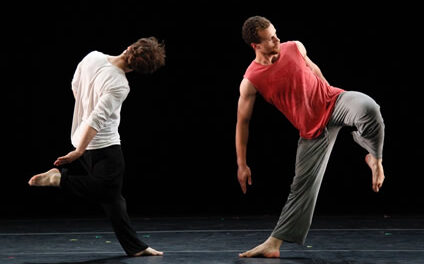Arthur Honegger, French-born composer of Swiss parents, was called on early in 1921 to write incidental music for René Morax’s new play based on events from the life of the Biblical King David. The play was scheduled to open in the small village of Mézières in Switzerland at the end of May. Several other composers had been approached and had declined on account of the short notice. Both the conductor Ernest Ansermet and Igor Stravinsky recommended the young and then almost unknown Honegger, and he gladly accepted the opportunity and the challenge. He wrote the score between February 25 and April 28. The first performance took place on June 11 and was such a success that extra performances were given.
The work was later scored as a concert piece for full orchestra, chorus and soloists, with narration written by Morax, to link the 27, mostly short, musical cells Honegger composed. Le Roi David was intended to hold the interest of an unsophisticated small town audience. To accomplish this, Honegger intentionally used somewhat lurid emotional and dramatic contrasts and a style somewhat suggestive of the Hollywood style that was to come. It is nevertheless cleverly conceived and theatrically effective. Its rugged rhythms, jaunty modal tunes, and dense polychordal harmony brought Honegger’s name to public attention, and its popularity is well deserved.
The Choral Society of Durham chamber choir under the musical guidance of Dr. Rodney Wynkoop brought King David to the Friday Center in Chapel Hill in an English translation with four-hand piano accompaniment. To be sure, the absence of the orchestra reduced the dramatic moods of the piece, but we understood the complication and difficulties of arranging such a performance, not the least of which was the venue; in the lobby area at the Friday Center.
The four hands at the piano belonged to David Cole and Scott Hill and they did a phenomenal job of coaxing heroic and gentle moods from the piano. Norm Loewenthal was superb as the narrator; his warm and steady baritone voice carried the story of David’s escapades ideally. The concert was rescheduled from January 24, when it was cancelled due to a winter storm.
After a brief piano prelude, the narrator told of Samuel’s calling to seek out a new king. The alto soloist, Laura Kaderabek, sang “The Song of David,” a setting of Psalm 23; a simple song with chromatic accompaniment. This was followed by a psalm in praise of David, a lively tune essentially in two-part counterpoint, typical of Honegger. It is one of the tunes that locks itself in your memory once you have heard it.
After David kills Goliath, there is a song of victory, then David (tenor James Hale) sings “In the Lord I put my faith.” Soprano, Kristen Blackman sang “O had I wings like a dove.”
The story continues as the narrator tells of the conflict between Saul and David. The men of the chorus sang “The Song of the Prophets” – oh what a glorious sound! Saul visited the Witch of Endor, a narration portrayed most persuasively by Florence Nash. Ed Overton read the narration of the Ghost of Samuel. Part I (Sections 1-14) ends with the “Lament of Gilboa,” the longest number to this point, featuring the narrator, soprano and alto soloists and women’s chorus.
Part II (Sections 15-16) consists of praise of the heroic and victorious David. “Song of the Daughters of Israel” was sung by the soprano soloist with women of the chorus. “The Dance before the Ark” is an extended hymn of praise to Jehovah ending with a really lovely soaring “Alleluia.”
Part III (Sections 17-27) tells of David’s sins, woes and contrition. It ends with “The Death of David” and the Angels reprising the “Alleluia.” As I left the Friday Center on a gorgeous sunny afternoon, I found this uplifting melody going with me.
The choral sound was excellent as usual for this exemplary chorus. Attacks and cutoffs were precise and phrases were shaped with artistic skill, both characteristic of choruses prepared by Wynkoop. The blending of voices, one of the few subtleties in this piece, was achieved effectively throughout. The soloists, all outstanding voices from the chorus, did their work in fine style. Kudos to the pianists and the narrator. There were occasions when the narrator was drowned out, but that would be hard to overcome given Honegger’s scoring.
Overall it was a delightful performance and a gratifying pleasure to hear.











